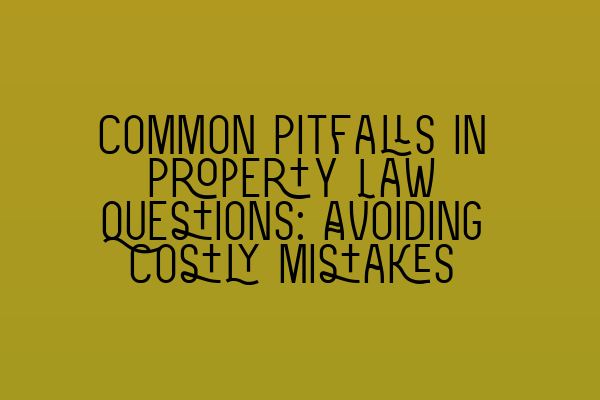Common Pitfalls in Property Law Questions: Avoiding Costly Mistakes
Welcome to SQE Property Law & Land Law! As experts in property law, we understand that navigating the legal complexities of property transactions can be a daunting task. Often, individuals find themselves in situations where they require legal advice and guidance to ensure they make the right decisions and avoid potential pitfalls that can lead to costly mistakes.
In this blog post, we will shed light on some common pitfalls in property law questions and provide insights on how to avoid them. Whether you are a first-time homebuyer, a property investor, or simply seeking to brush up on property law knowledge, this article will equip you with valuable information that can help save you time, money, and unnecessary stress.
1. Inadequate Due Diligence: One of the most significant mistakes people make is not conducting thorough due diligence before entering into a property transaction. Failing to obtain proper legal advice, conducting property searches, and reviewing title deeds can result in hidden liabilities, disputes, or even fraudulent transactions. Always remember, ‘prevention is better than cure.’
2. Incomplete or Incorrect Contracts: Property transactions involve various contracts, such as purchase agreements, leases, or easements. Making mistakes in the drafting or understanding of these contracts can have serious consequences. Ensure that you carefully review all contractual terms, seek professional advice when needed, and never assume anything. Attention to detail is key!
3. Mortgage Misunderstandings: Securing a mortgage is often an integral part of property transactions. Unfortunately, many people fail to fully understand the terms, conditions, and implications of their mortgage agreements. Take the time to comprehend the details of your mortgage, including interest rates, repayment terms, and potential penalties. Seek clarification from your lender or a legal professional if necessary.
4. Overlooking Planning Permission: Ignoring or overlooking planning permission requirements can lead to major problems down the line. Whether you are undertaking renovations, building an extension, or changing the use of a property, ensure that you have all the necessary permits and consents in place. Failure to do so can result in enforcement actions, fines, or even demolition orders. Don’t skimp on proper planning!
5. Failure to Address Boundary Issues: Boundary disputes are all too common in property law cases. Encroachments, unclear boundaries, or disagreements with neighbors can quickly escalate into costly legal battles. To avoid such conflicts, review and clearly define property boundaries, seek professional help for surveys, and communicate with neighboring property owners to address any potential issues upfront.
6. Inadequate understanding of Leasehold Properties: Leasehold properties come with their own set of complexities and legal obligations. Failing to understand lease terms, service charges, ground rent, and leasehold reforms can cause financial strain and legal issues. If you are purchasing or already own a leasehold property, ensure that you fully comprehend your rights and obligations as a leaseholder.
7. Disregarding Environmental Considerations: Environmental issues, such as contaminated land or flood risks, can significantly impact property value and usability. Conducting environmental searches and obtaining specialist advice can help identify potential risks and enable you to make informed decisions. Keep in mind that prevention and mitigation are vital when it comes to environmental concerns.
8. Procrastination and Lack of Timeliness: Lastly, procrastination and lack of timely action can be detrimental in property law matters. Property transactions have strict deadlines and legal procedures that must be followed. Failing to act promptly can lead to missed opportunities, financial losses, or even legal disputes. Stay organized, seek professional advice promptly, and proactively manage key dates and deadlines.
In conclusion, property law is a complex and ever-evolving area of law. Avoiding the common pitfalls mentioned in this article can help you save time, money, and unnecessary stress. Remember to conduct due diligence, seek professional advice, thoroughly review contracts, and stay proactive in managing your property transactions.
At SQE Property Law & Land Law, we are dedicated to providing comprehensive legal services tailored to your specific property law needs. Our team of experienced solicitors is here to guide you through the intricacies of property law, ensuring that you make informed decisions and avoid costly mistakes. Contact us today for expert advice and assistance with all your property law queries.
Disclaimer: The information provided in this blog post is for general informational purposes only and does not constitute legal advice. Always consult a qualified solicitor or legal professional for advice specific to your situation.
